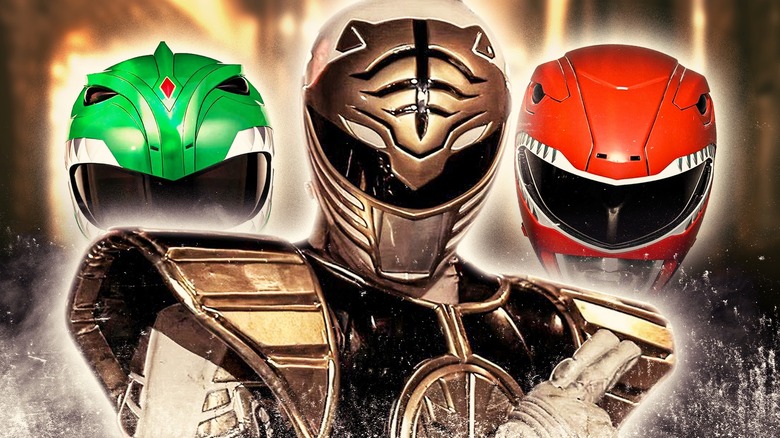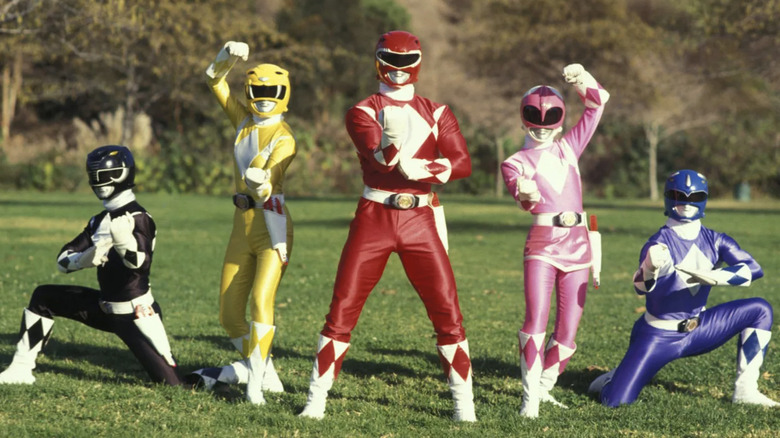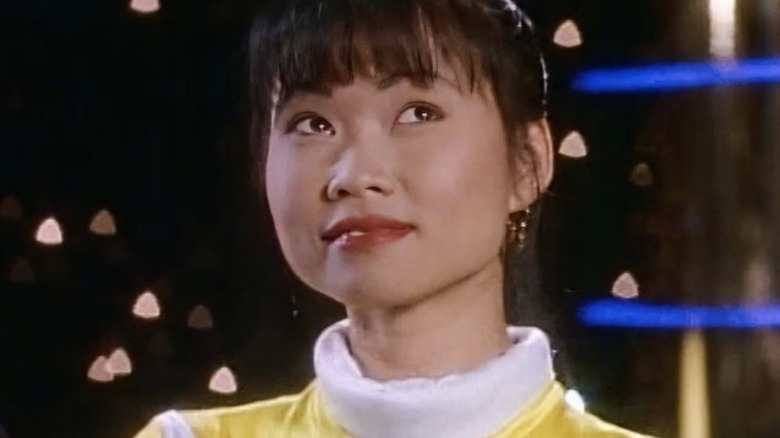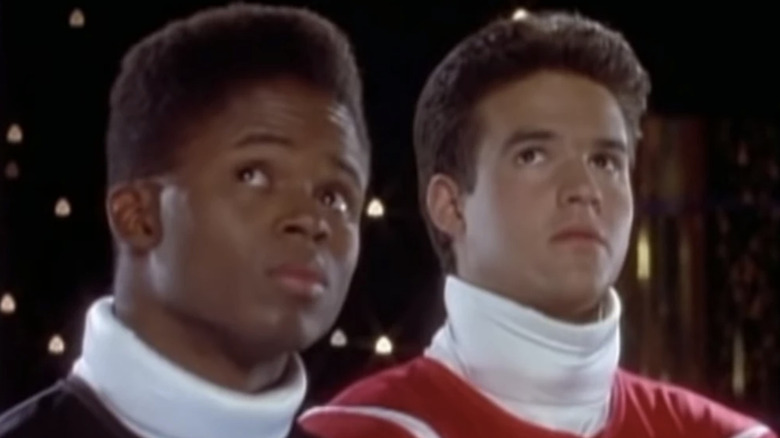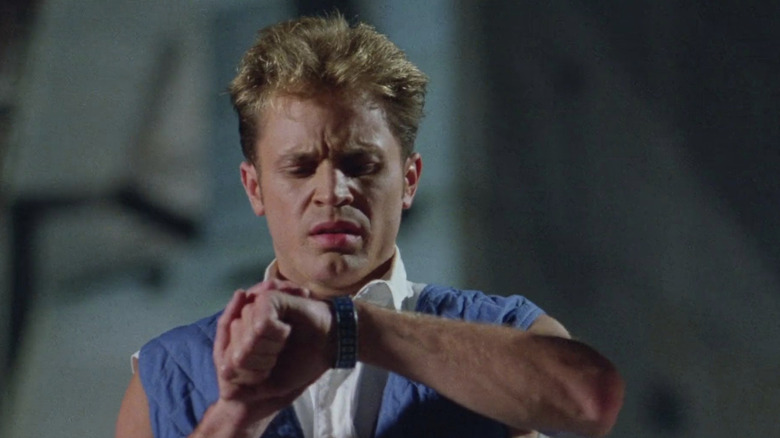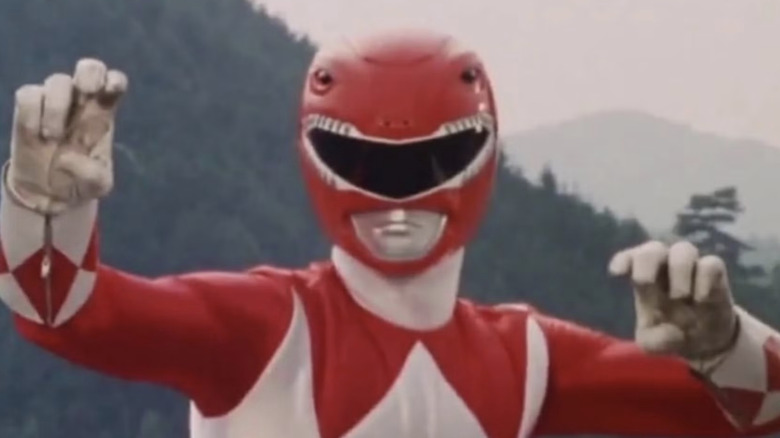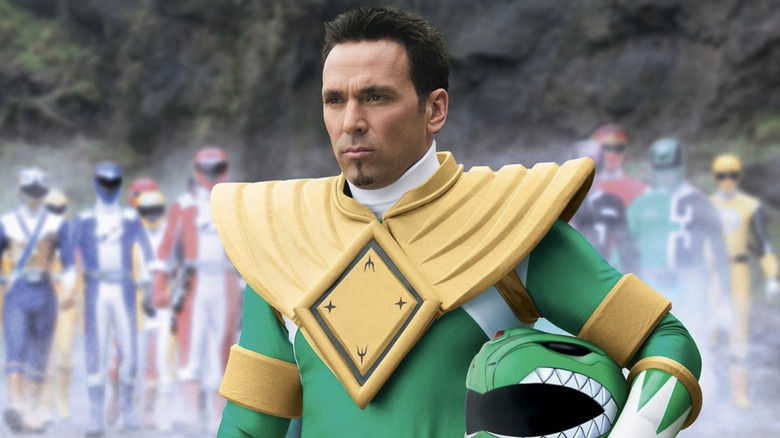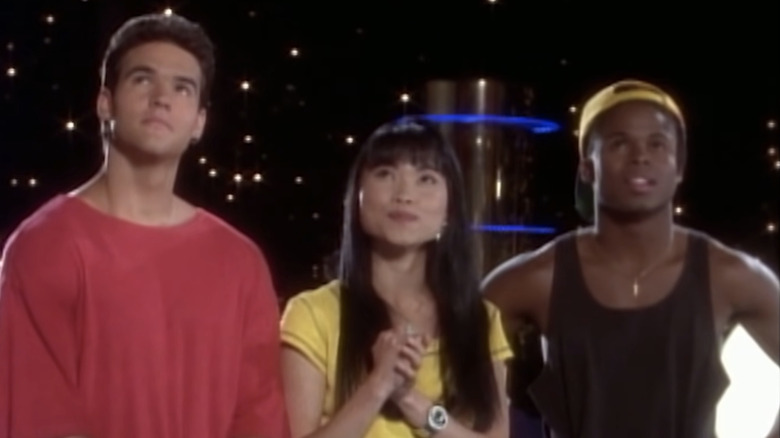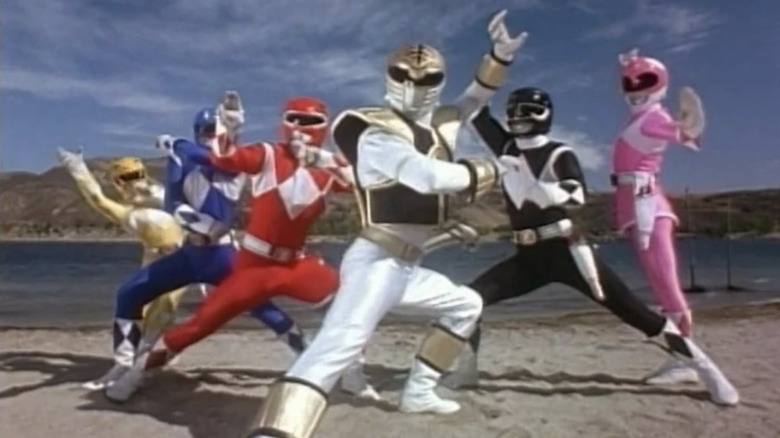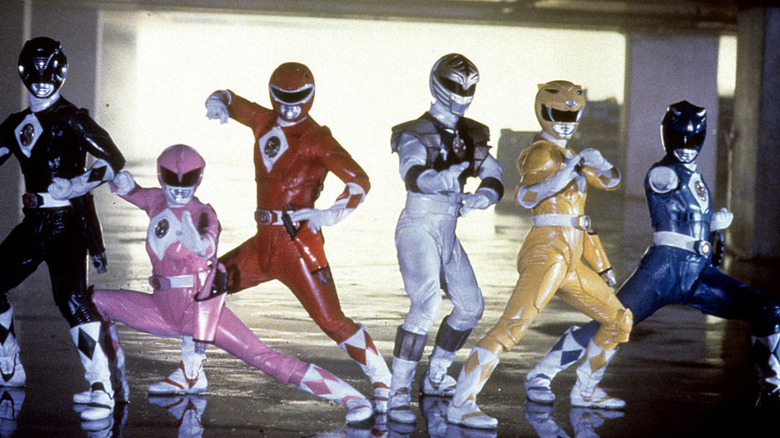The Dark Truth About The Mighty Morphin Power Rangers
There are few shows made for younger audiences that left as massive a cultural impact as the original "Mighty Morphin Power Rangers" did in the 1990s. Though it pulled footage from the Toei Company's "Super Sentai" franchise (a detail perhaps only true Sentai warriors know), Saban Entertainment crafted its own story about a half-dozen "teenagers with attitude" who were destined to save the world. "Power Rangers" became an international phenomenon, one that spawned not only 30 different seasons of television, all told, but also various feature films, video games, comic books, and action figures. Still, nothing beats the original "MMPR," even if the three-season series has some dark truths of its own.
Whether we're talking about the actor's personal lives, behind-the-scenes drama, or off-screen controversy, there are plenty of things you might have never heard about the original program and its stars. While the Rangers were fighting for our world on Saturday mornings, there was a lot more going on in the lives of each cast member than any of us knew at the time. Yes, even a show about heroes like the Power Rangers has its dark secrets, and these are some of the most notable truths from our heroes' pasts (and some of their presents) that you probably never knew about "Mighty Morphin Power Rangers."
The show's title got the heroes banned in Malaysia
It's easy to assume that if "Mighty Morphin Power Rangers" were banned for any particular reason, it would probably be due to violence. But while that was a problem many parents had with the series (we'll get into that later), it wasn't the issue that kept Malaysia from airing the highly rated program. According to a CNN report in 1995, the original "Power Rangers" was banned in the Southeast Asian country because of a specific word in its title: "Morphin." Of course, longtime fans know that the word "morphin" is really just another word for the transformation the Rangers undergo from being normal teenagers in their hometown of Angel Grove into super-powered superheroes. But that's not how Malaysia took it.
Evidently, "morphin" sounded too much like the word morphine, which (perhaps understandably) raised some immediate red flags. After initially banning the series completely, the country eventually decided to allow the show to be aired, provided the aforementioned word was deleted entirely. While it's unclear if the word had to be removed from every individual episode (and, considering it's said constantly, that would be a real undertaking), Malaysia relented on "Power Rangers" as long as audiences didn't think the children's series was promoting drug use.
Thuy Trang died at only 27 years old
Perhaps the biggest tragedy of the original "Power Rangers" was the death of original Yellow Ranger actor,Thuy Trang. In the first two seasons, Trang played Trini Kwan, a brainy and athletic teen who was gifted the powers and spirit of the sabretooth tiger when she transformed into the Yellow Ranger. Trini was with the Rangers from the very beginning and was one of the brightest spots of the original show. Between 1993 and 1994, Trang appeared in a total of 80 episodes of "Mighty Morphin Power Rangers" before exiting the series. After that, she only appeared in two more projects, "Spy Hard" and "The Crow: City of Angels," before leaving acting behind entirely.
Unfortunately, Trang never appeared in another project. In 2001, the actress was killed in a fatal car accident when she was only 27 years old. "She was way too young and had so much more to share with the world," Trang's "MMPR" co-star Walter Emanuel Jones (the original Black Ranger) told Entertainment Weekly years later. "I remember how sweet Thuy was to people. She especially had a way with kids. Her energy drew you in, and her smile made your heart feel safe." Trang's former co-stars Amy Jo Johnson (Pink Ranger) and David Yost (Blue Ranger) both attended her funeral service, with the former giving a eulogy. The "Power Rangers Time Force" episode "Circuit Unsure" was dedicated in her memory.
Decades later, in 2023, Yost and Jones reunited with some of their other former co-stars for the 30th anniversary project "Mighty Morphin Power Rangers: Once & Always," which paid perfect tribute to Thuy Trang. This hour-long special centered on Trini Kwan's daughter, Minh Kwan (Charlize "Charlie" Kersh), who takes up her mother's Yellow Ranger role.
Austin St. John and Walter Emanuel Jones threw wild Hollywood frat parties
If you always thought it would be fun to party with the Power Rangers, then you should have lived in Los Angeles in the mid-1990s. Back then, you may have had your chance. According to Walter Emanuel Jones in a 2014 interview with The Huffington Post, he and his roomate/co-star, Austin St. John (the original Red Ranger), threw wild Hollywood parties regularly. "We had pool tables, we had a trampoline, we had a huge Burmese python that was 12-feet long, and we'd just have a good time," Jones recounted. Sometimes, the pair would come home to find around 150 people (most of whom he didn't even know) in their home in Glendale, California.
David Yost described these parties as more of a "frat house," but noted that they always produced the most memorable stories. "We had some parties that were so big," St. John chimed in. "Inevitably somebody would call the police and a helicopter would show up and put a spotlight on the backyard where we had a volleyball net." That's a lot bigger than just your average college rager. These events, which were held at least once a month at the time, sound more like something you'd see in an episode of "Blue Mountain State" than "Mighty Morphin Power Rangers," but hey — that's showbiz.
The original Yellow Ranger left due to a contract dispute
As much as we loved Thuy Trang as Trini Kwan, the truth is that she wasn't the first actress to play "MMPR's" resident Yellow Ranger. When Saban Entertainment was still trying to sell the "Power Rangers" to Fox Kids, the production had cast Audri Dubois as Trini for the first attempt at a pilot episode (known these days as "The Lost Episode"). "At the time, the audition was called 'Dino Rangers,' not 'Power Rangers,'" Dubois told Galactic Productions in 2018 (via YouTube). The former Ranger explained that Trini was originally written as a scaredy cat who couldn't fight to save her life, but all of that changed when she impressed the producers with her karate moves (Dubois had a black belt in the martial art).
While the rest of the original cast were cemented in their roles, Dubois opted not to continue with the series, forcing "MMPR" to recast and re-shoot the first episode. Still unsure if she wanted to pursue acting as a career, she didn't want to uproot her life for the opportunity. But Dubois left the series without saying goodbye to the new friends she had made while shooting the pilot, a decision that still haunts her decades later. "Them just finding out from someone else one day that, 'Audri left, and she's not coming back,'" she reflected, "That wasn't cool. I wish I could have done that part over." Maybe one day Dubois will have her chance to return to the world of "Power Rangers."
David Yost left Power Rangers due to homophobia
As one of the longest-running original cast members of the "Mighty Morphin Power Rangers" franchise, fans wondered for years why David Yost — who played the original Blue Ranger, Billy Cranston — left the show following "Power Rangers Zeo." In a 2010 interview with No Pink Spandex, the former "MMPR" star explained. "I walked off set one day, during the middle of lunch, during ... halfway through the day," Yost began. "And the reason I walked off is because I was called 'f*****' one too many times." Yost explained that the writers, producers, and directors made fun of him for his sexual orientation while on set, and, finally, he had enough.
"Continuing to work in an environment like that is really difficult," he elaborated, explaining that the vibe he got was that he couldn't be gay and be a superhero. "There was just a lot of issues; it just felt like a bad marriage." Leaving "Power Rangers" gave the actor the opportunity to "get a handle" on his own life and work through his own mental health struggles. For decades, Yost kept the franchise at a distance, refusing to return for specials or guest appearances until Netflix's 2023 reunion special, "Mighty Morphin Power Rangers: Once & Always." Following the reunion, he joined the main cast of "Power Rangers Cosmic Fury" — the third and final season of the "Power Rangers Dino Fury" story — in a mentorship role to the next generation of heroes.
Austin St. John got in trouble for fraud
While the first "Mighty Morphin Power Rangers" cast played superheroes on television, that doesn't mean all of them were angels off-screen. Though Austin St. John has been the face of the original series since it first premiered in 1993 — responsible for bringing the original Red Ranger, Jason Lee Scott, to life — the actor has faced some serious legal troubles since his time with a morpher. In 2022, St. John (whose real name is Jason Geiger) was arrested for COVID-19 pandemic-related fraud after receiving over $400,000 in Paycheck Protection Program loans. In May 2024, the actor was deemed guilty of one count of conspiracy to commit wire fraud. But this isn't the only controversy the original Red Ranger has found himself embroiled in.
That same year, St. John was called out by his former co-star Amy Jo Johnson for a clothing brand he announced that pulled quotes from different "warriors" throughout history, including Adolf Hitler. "Rogue Red Ranger has an entire new meaning," she posted on X after St. John first called Hitler "a demon on steroids" with "some pretty good one-liners" on an episode of the "Toon'd In! with Jim Cummings" podcast. When the Warrior line (which he later rebranded as Wise Leader) launched in April 2024, there were (thankfully) no Hitler quotes to be found. Instead, Wise Leader features only positive historical figures, as well as some of the actor's personal heroes, including Bruce Lee and Chuck Norris.
Original Green Ranger Jason David Frank died of suicide
Longtime "Power Rangers" fans tend to agree that, of all the Rangers in the series' canon, none are more impressive than Tommy Oliver. Jason David Frank first appeared as Tommy in "Mighty Morphin Power Rangers" as the Green Ranger, only to become the White Ranger, Red Ranger, and Black Ranger in his time with the franchise. He was the original team's first "secret weapon," eventually became their leader, and later transitioned to a mentor role for future Power Ranger generations. Ultimately, Frank appeared as Tommy in over 200 episodes of the franchise, with his final performance in 2018 celebrating the 25th anniversary in the "Power Rangers Ninja Steel" episode, "Dimensions in Danger."
For "Power Rangers" fans everywhere, there was no tragedy more heartbreaking than Jason David Frank's devastating death. The actor died by suicide in 2022, leaving behind his wife and children after struggling for some time with issues of mental health. "Jason was a good man, but he was not without his demons," Tammie Frank told People Magazine following her husband's death. "He was human, just like the rest of us." Though Frank didn't appear in the "Mighty Morphin Power Rangers: Once & Always" 30th anniversary reunion special (which was shot prior to his death), it was dedicated to his and Thuy Trang's memory.
As for Tommy Oliver, his story would be concluded in the BOOM! Studios comic book, "Power Rangers: Soul of the Dragon," which told a story co-created by Frank himself. Frank's final live-action performance was in the "Power Rangers"-inspired feature film "Legend of the White Dragon," which was originally scheduled to be released in 2024 before post-production delays pushed it back.
Contract disputes led to three main characters exiting the show
Though "Mighty Morphin Power Rangers" started with five "teenagers with attitude," the franchise grew far beyond the heroes who fans first fell in love with. Never was that more clear, though, than in the two-part "passing the torch" episode, "The Power Transfer." About halfway through "MMPR's" second season, Jason (Austin St. John), Trini (Thuy Trang), and Zack Taylor (Walter Emanuel Jones) left the Power Rangers to join a global peace summit, handing off their respective power coins to newcomers Rocky DeSantos (Steve Cardenas), Aisha Campbell (Karan Ashley), and Adam Park (Johnny Yong Bosch). These new Rangers remained in their roles through the rest of the series and even appeared in 1995's "Mighty Morphin Power Rangers: The Movie." But why? Well, the simple answer is that the original cast wanted to be paid more, and Saban wouldn't play ball.
"I could have worked the window at McDonalds and probably made the same money the first season," St. John told The Huffington Post in 2014. "It was disappointing, it was frustrating, it made a lot of us angry." Sadly, there wasn't much the leading stars could do about it, though they tried. "I figured after two seasons we deserved to be a union show," Jones explained. "So three of us ended up negotiating and three of us stayed." Jason David Frank, David Yost, and Amy Jo Johnson remained on the program, but St. John, Trang, and Jones had had enough. Once the power transfer was complete, they never appeared on the original "MMPR" series again.
The show had pretty poor working conditions
But why did it matter that "Mighty Morphin Power Rangers" was a non-union series? Surely these highly popular superheroes were taken care of, right? Well, no. As it turns out, starring on "Power Rangers" meant dealing with some pretty undesirable working conditions, mainly concerning compensation. The cast struggled to earn a living wage while working on the show, despite filming 40 episodes before the series even aired. The pay was so bad that Austin St. John was even forced to live in his car for a time after he left the series. Even before that, he couldn't afford a place of his own. "Walter [Jones] and several of the stunt guys, we moved into the same house to try and save money because we weren't paid well at all," the actor told Entertainment Weekly in 2018.
In a 2012 interview with No Pink Spandex, Amy Jo Johnson let the cat out of the bag. "We were being paid, I think, tops $600 a week," she revealed, noting that they didn't even get residuals for their efforts. "In hindsight, I wonder if we all band[ed] together. I wonder what would have happened. I wonder if we would've become Union." Though the series did eventually unionize, it was too late for the original cast. Actually, it was too late for any "Power Rangers" cast; the trend had started, and the "Power Rangers" brand became known for its frequent turnover (which explains every "Power Rangers" series' differing cast members), with the entire roster of Rangers rotating out every season or two across its 30 years on the air.
Mighty Morphin Power Rangers was too violent for some countries
Though "Power Rangers" merchandise was all the rage in the mid-'90s, the series was criticized by some parents who deemed the program too violent for their children. A 1994 The New York Times piece quoted one concerned parent who believed "MMPR" actively "sends a message to children that violence is a way of life and that it's a good way to solve your problems." The very same article noted that 25% of the show contained violent action sequences, a number that prompted the Canadian channel YTV to remove "Power Rangers" from its lineup — and Canada wasn't the only country concerned about this then-controversial topic.
"Mighty Morphin Power Rangers" was likewise removed from the air in Norway, Sweden, and Denmark after a young girl was killed in an incident completely unrelated to the show itself. That same year, The Los Angeles Times reported on a study linking watching "Power Rangers" to "harassing playmates with karate kicks and aggressive shoves." According to the report, kids who watched the series were six times more likely to resort to violence when dealing with conflict. "One of the scary things about violence in the media is it gives children new ideas about how to be aggressive and be violent," explained Professor Chris Boyatzis, who oversaw the study.
Of course, let's not forget that around the same time, other Fox Kids programs such as "Batman: The Animated Series," "Teenage Mutant Ninja Turtles," and "X-Men: The Animated Series" were just as popular. Still, the "Power Rangers" survived, despite protests from some, and has since built a 30-year legacy that stands strong on its own. Violent or not, "Mighty Morphin Power Rangers" is a hit, and there's a reason fans continue to support this monumental series.
